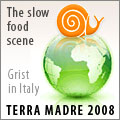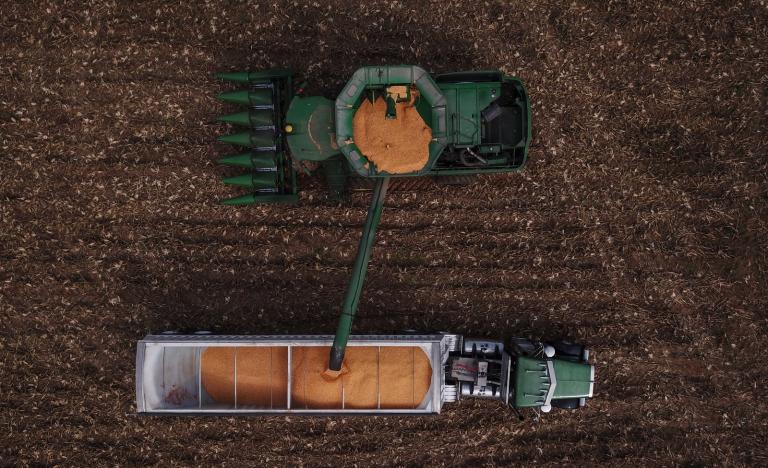
Turin, Italy — On the one hand, I’m exhausted and jetlagged after a day of meeting people, listening to speeches, walking the streets of Turin, and noshing on lots of cured meat, cheese, olives, and other pungent goodies.
On the other hand, I’m sipping a glass of Barolo — a celebrated red wine named after a town not far from Turin — at the Salone del Gusto, a kind of vast tasting pavilion. The wine I chose was one of more than 2,000 on offer at the Salone’s expansive enoteca (wine bar). (I’m the only one with a laptop open — "blogger" seems a rare and invasive species here.)
Along with Terra Madre — a meeting of "food communities" from around the world — the Salone is part of Slow Food’s biennial throwdown in Turin, an industrial city (pop. 917,000) in Italy’s northeastern Piedmont state.
The Salone represents a kind of glorious contradiction — a paradoxical celebration of consumerism (2,000 wines to choose from!) and place (each representing a specific place!).
I arrived Wednesday morning after a sleepless red-eye flight, and focused on getting my bearings in Turin. Much of the city seems run-down and shabbily modern — postwar apartment blocks, worse for the wear, along traffic-clogged roads. But the city center is a baroque gem — grand, lavishly detailed old buildings, languishing in the autumnal fog.
At a wine bar in the centro, I had a solid but unspectacular meal: pasta with sausage ragu, lamb, and roasted potatoes. I went to bed early, and woke up more or less refreshed.
I made my way to the Lingotto, the site of most of Terra Madre/Salone del Gusto. The Lingotto complex is an odd beast made up of of three huge, low-slung buildings. The largest is an ultra-functionalist pile, built in 1915, that until 1982 housed the main factory for Fiat. In a breathtaking feat of de-industrialization, it now houses a U.S.-style shopping mall, complete with a multiplex cinema.
In 1992, the City of Turin plunked down not one but two convention centers, designed mainly to hold car shows.
I have to confess, on walking into the Salone (which nearly fills both buildings) first thing Thursday morning, my first reaction was: soulless trade show. Exhibitors were busily setting up stands, bringing out variations on the themes of olive oil, vinegar, olives, and cured meat. These are all things that I adore; but seeing dozens if not hundreds of stands preparing to hawk them overwhelmed me at 9 a.m.
Elsewhere, people were milling into an auditorium, where Carlo Petrini and other Slow Food luminaries were set to deliver opening remarks to the press. In keeping with the trade-show theme, the room was thick with Serious Guys in Suits.
When Petrini began speaking, I realized the press conference would not be translated into English. Having no command of Italian, I slung out to try my luck among the stands on the Salone’s floor.
At first, I was put off. Yes, I loved the little nibbles of sun-dried tomatoes, little slices of bread drenched in olive oil, and bits of prosciutto, etc. I got especially excited by the stand featuring balsamic vinegar of Modena, ranging from young, sweet-sour, salad-grade stuff to the aged product that costs 100 euros for a tiny bottle. I’ve never tasted fancy balsamic before. It was glorious — full, round, syrupy with a long finish as haunting as a great port.
But the air of commerce — of people trying to sell you stuff, even if fantastic in quality — made me feel uneasy.
Then I wandered into the section devoted to the "presidia" — the producers from all over the world whose products Slow Food has deemed endangered, whether by market forces or (in the case of, say, certain raw-milk cheeses) government harassment.
This is where you find Polish artisans showing off a particular sort of pickle and Romanian shepherds with a special kind of cheese. And it’s where I ran into my friend the fermentation proselyte Sandor Katz, who introduced me to his friend the food scholar Jeffrey Roberts.
Their enthusiasm rubbed off on me, their vast knowledge inspired me, and soon I understood the grandeur of the Salone del Gusto.
And at that, I must wrap up, as my internet access is coming to a close for the night.

